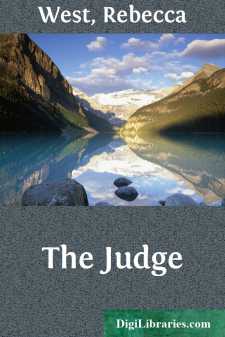Categories
- Antiques & Collectibles 13
- Architecture 36
- Art 48
- Bibles 22
- Biography & Autobiography 813
- Body, Mind & Spirit 142
- Business & Economics 28
- Children's Books 17
- Children's Fiction 14
- Computers 4
- Cooking 94
- Crafts & Hobbies 4
- Drama 346
- Education 46
- Family & Relationships 57
- Fiction 11829
- Games 19
- Gardening 17
- Health & Fitness 34
- History 1377
- House & Home 1
- Humor 147
- Juvenile Fiction 1873
- Juvenile Nonfiction 202
- Language Arts & Disciplines 88
- Law 16
- Literary Collections 686
- Literary Criticism 179
- Mathematics 13
- Medical 41
- Music 40
- Nature 179
- Non-Classifiable 1768
- Performing Arts 7
- Periodicals 1453
- Philosophy 64
- Photography 2
- Poetry 896
- Political Science 203
- Psychology 42
- Reference 154
- Religion 513
- Science 126
- Self-Help 84
- Social Science 81
- Sports & Recreation 34
- Study Aids 3
- Technology & Engineering 59
- Transportation 23
- Travel 463
- True Crime 29
The Judge
by: Rebecca West
Categories:
Description:
Excerpt
I
It was not because life was not good enough that Ellen Melville was crying as she sat by the window. The world, indeed, even so much of it as could be seen from her window, was extravagantly beautiful. The office of Mr. Mactavish James, Writer to the Signet, was in one of those decent grey streets that lie high on the northward slope of Edinburgh New Town, and Ellen was looking up the side-street that opened just opposite and revealed, menacing as the rattle of spears, the black rock and bastions of the Castle against the white beamless glare of the southern sky. And it was the hour of the clear Edinburgh twilight, that strange time when the world seems to have forgotten the sun though it keeps its colour; it could still be seen that the moss between the cobblestones was a wet bright green, and that a red autumn had been busy with the wind-nipped trees, yet these things were not gay, but cold and remote as brightness might be on the bed of a deep stream, fathoms beneath the visitation of the sun. At this time all the town was ghostly, and she loved it so. She took her mind by the arm and marched it up and down among the sights of Edinburgh, telling it that to be weeping with discontent in such a place was a scandalous turning up of the nose at good mercies. Now the Castle Esplanade, that all day had proudly supported the harsh, virile sounds and colours of the drilling regiments, would show to the slums its blank surface, bleached bone-white by the winds that raced above the city smoke. Now the Cowgate and the Canongate would be given over to the drama of the disorderly night; the slum-dwellers would foregather about the rotting doors of dead men's mansions and brawl among the not less brawling ghosts of a past that here never speaks of peace, but only of blood and argument. And Holyrood, under a black bank surmounted by a low bitten cliff, would lie like the camp of an invading and terrified army.... She stopped and said, "Yon about Holyrood's a fine image for the institution of monarchy." For she was a Suffragette, so far as it is possible to be a Suffragette effectively when one is just seventeen, and she spent much of her time composing speeches which she knew she would always be too shy to deliver. "There is a sinister air about palaces. Always they appear like the camp of an invading army that is uneasy and keeps a good look-out lest they need shoot. Remember they are always ready to shoot...." She interrupted herself with a click of annoyance. "I see myself standing on a herring-barrel and trying to hold the crowd with the like of that. It's too literary. I always am. I doubt I'll never make a speaker. 'Deed, I'll never be anything but the wee typist that I am...." And misery rushed in on her mind again. She fell to watching the succession of little black figures that huddled in their topcoats as they came down the side-street, bent suddenly at the waist as they came to the corner and met the full force of the east wind, and then pulled themselves upright and butted at it afresh with dour faces....


